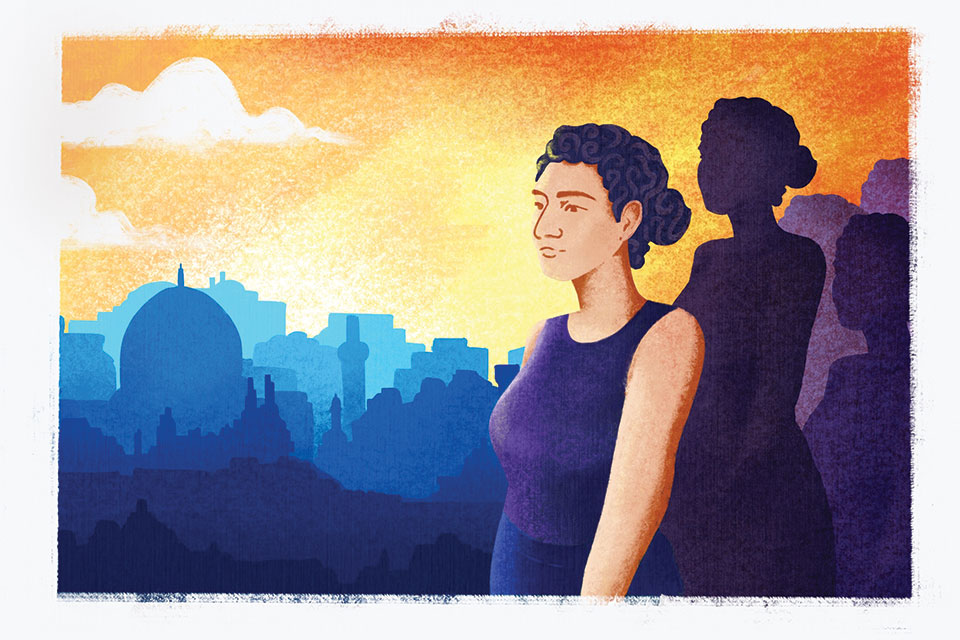Turning Points
The War That Changed Everything

By Naomi Kleinberg ’75
Have an “aha“ moment you’d like to share with Turning Points?
Please send a query letter to gardner@brandeis.edu.
At 2 p.m. on Oct. 6, 1973, a very quiet Yom Kippur day, my roommate, Sheila Trugman ’75, and I were napping in our Jerusalem apartment when we were awakened by a loud air-raid siren.
In our two months in Israel, we’d never heard so much as an ambulance or a police car. Puzzled, we looked across the street and watched a woman walking with two young children. She stopped, put a child under each arm, and began to run.
Our neighbor told Sheila, “I think it’s a war,” and gave us directions to the nearest bomb shelter. We grabbed our passports and wallets, and left. The streets were filled with traffic. Open trucks carried soldiers. Other soldiers, half-dressed in their uniforms, chased behind on foot until their comrades could pull them up into the moving vehicles.
Israel — and, it seemed, we Jews — were under attack. Though shocking, this unanticipated turn felt weirdly inevitable.
Sheila and I were among three dozen students spending a semester at Brandeis’ Jacob Hiatt Institute in Israel. The institute’s study abroad program included classes in Hebrew and in Israeli politics, sociology, geography, and history.
I’d been searching for a way to be Jewish. My parents celebrated just Passover and Hanukkah. My father was both a fiercely proud Jew and an atheist, which confused me. Israel seemed a good place to explore my Jewishness. I felt at home there.
A few weeks before the war began, our Hiatt group engaged in an identity exercise that had required real introspection and, ultimately, changed the way I saw myself. I’d always thought of myself as an American and a citizen of the world, not all that different from anyone else, someone who just happened to be Jewish.
Now I knew this: I was a Jewish woman above all else. All the rest was commentary.
I felt resolute, because this knowledge was now immutable. I felt defiant, because with all that had befallen the Jewish people, we were still here. And I felt afraid, because of my family’s history. My maternal ancestors were expelled from Spain. My paternal grandmother left Poland in the early 1900s, fleeing the Cossacks. Her brother’s family stayed; they were murdered by the Nazis.
If the world reviled the Jews, I would be proudly, unapologetically Jewish.
During the war, Hiatt students volunteered wherever we were needed, filling in for men now at the front and helping beleaguered families. Program officials told us we’d be safe, and, in the end, we were. After the semester was over, most of us went back to our schools.
When I got home to Brandeis, I was still searching for answers. Our beloved campus rabbi, Al Axelrad, suggested I look into Reconstructionism — a perfect answer to my queries about how to be a Jew without a belief in a supernatural God.
“Israel — and, it seemed, we Jews — were under attack. Though shocking, this unanticipated turn felt weirdly inevitable.”
I studied more Hebrew and, later, Yiddish. I asked more questions about both sides of my family and had long conversations with my grandfather. I read Israeli newspapers, saw Israeli movies, listened to Israeli music. I married and divorced. I visited Israel half a dozen times and yearned for limitless time there.
In my late 30s, I headed to Kibbutz Hazorea for a six-month work-study ulpan, an intensive Hebrew-language program. I loved kibbutz life — the community; the physical labor; the rhythm of the days; the chance to thrive in a green, blossoming place. I met the man who would become my second husband. We applied for kibbutz membership and were accepted. We were there for the Galilee’s first snowfall in 40 years, the secret airlift that brought thousands of Ethiopian Jews to Israel, a winter flood.
But after two happy years, my mother died unexpectedly, and my family was adrift and needed help. So we left Israel — and our hearts — behind. We joined a synagogue (a first for me) that fit our outlook. We raised our child with the Jewish education I’d never had. At work, I edited Jewish picture books and a “Sesame Street” book series on Jewish holidays.
Last Oct. 6, to mark the 50th anniversary of the war we had lived through, my Hiatt classmates and I got together for an emotional round of remembrance and reflection.
The next morning, we awoke to harrowing news: Israel had again been caught by surprise, this time invaded by terrorists in a vicious, unprecedented attack.
Wrenching memories of the past now mix with the present trauma in an intense brew of anger and grief.
I am still defiant but also in despair.
Naomi Kleinberg is a retired children’s book editor and author in New York City.